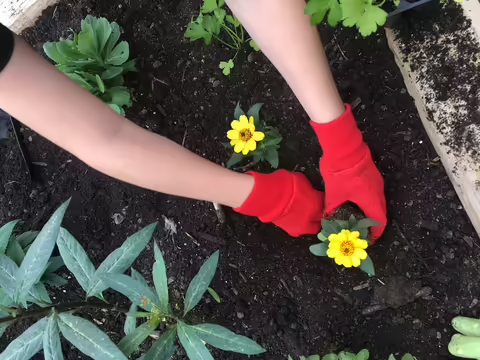URBANA, Ill. — Even with the best teachers and best technology, sometimes the best learning happens in the garden. Many school grounds have gardens for visual reasons, but the benefits of having flowers, herbs, vegetables, and fruit trees go far beyond beautification.
“While so much emphasis put on the use of technology in the classroom, many kids today are missing out on the experience right outside the school doors,” says Brittnay Haag, a University of Illinois Extension horticulture educator.
School gardens create hands-on learning opportunities for students that aren’t typically found in a classroom. Classes where students are able to plan, plant, and care for a green space have been proven to benefit not only the youth but also their community in a variety of ways. Research shows gardening activities can be brought into a variety of subjects and bring learning to life for science, social studies, math, writing, visual arts, health, and nutrition.
“Imagine being able to dig in the soil to explore its makeup instead of looking at pictures,” says Haag. “Students can observe firsthand the act of pollination and the life cycle of plants, or be inspired by the garden while writing an essay or painting a picture.”
The garden can also be used for health and nutrition lessons or a place to practice physical fitness while pulling weeds or spreading mulch. By growing fruits and vegetables, children's food attitudes and behaviors can change for the better. They are more likely to eat vegetables they have grown themselves and share those preferences with others.
Young learners need a place to play, explore, and learn. School gardens can be an asset to every student and teacher, offering a place to get outdoors, connect with the natural world, and explore new concepts through experiential learning.
Illinois Extension horticulture staff are available to assist schools and childcare facilities of all sizes and grade levels with starting a garden, reviving an existing garden, or connecting the curriculum to the garden. To connect with an educator in your area, visit go.illinois.edu/ExtensionOffice.
SOURCE: Brittnay Haag, Horticulture Educator, University of Illinois Extension
ABOUT EXTENSION: Illinois Extension leads public outreach for University of Illinois by translating research into action plans that allow Illiois families, businesses, and community leaders to solve problems, make informed decisions, and adapt to changes and opportunities.
PHOTO ACCESS: The photo in this article is available to download for media use.
